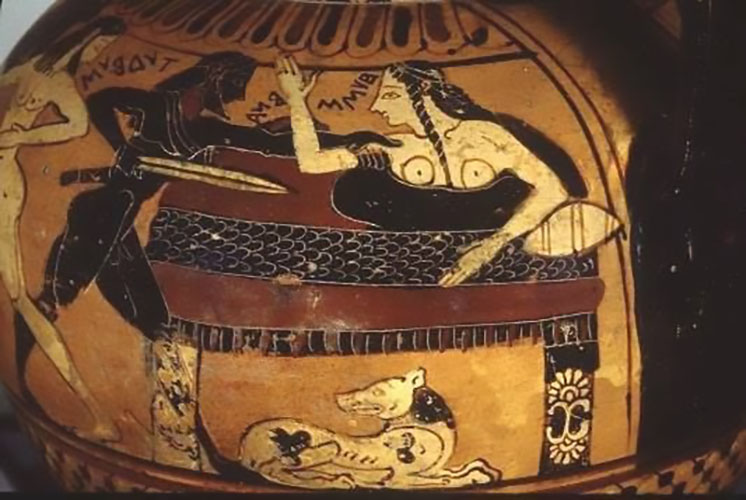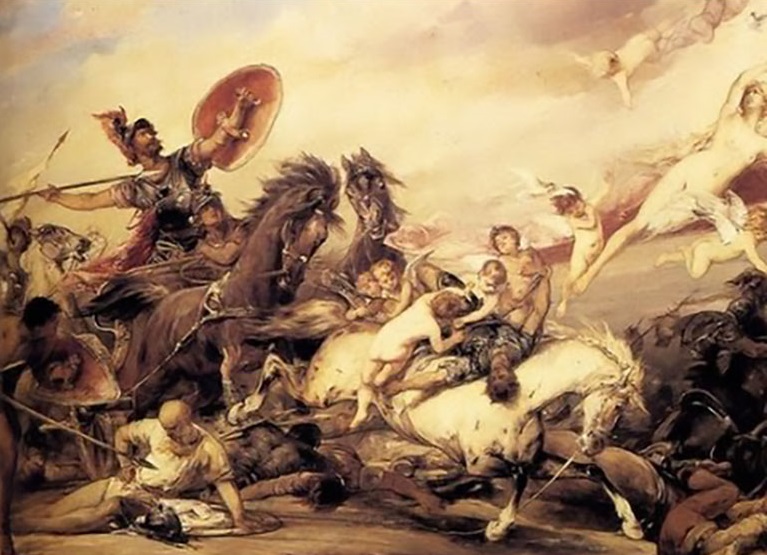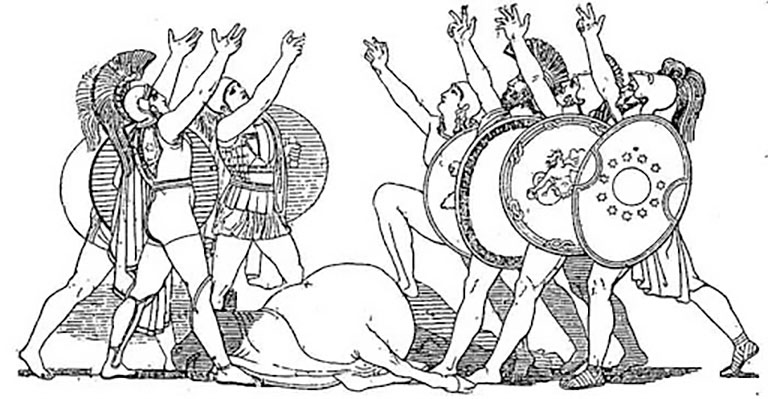Tydeus
In Greek mythology, Tydeus (Ancient Greek: Τυδεύς) was an Aetolian hero of the generation before the Trojan War. He was one of the Seven Against Thebes, and the father of Diomedes, who is frequently known by the patronymic Tydides.
Mythology
Exile
Tydeus was a son of Oeneus and either Periboea, Oeneus's second wife, or Gorge, Oeneus's daughter. He was the husband of Deipyle, the mother of Diomedes.
Tydeus was banished from Calydon by his uncle Agrius, because he killed either his brother or a different uncle or six of his cousins.
Specifically, the prince of Calydon would be forced into exile whilst still a young man, for Tydeus was said to have committed murder; killing either his uncle Alcathous; another uncle, Melas; the sons of Melas; or his own brother Olenias. It was said that Tydeus, no matter who the victim was, was driven to murder because of a plot to overthrown his father Oeneus. Thus, Tydeus was sent into exile by another uncle, Agrius.
Tydeus would travel to Argos and found sanctuary in the court of King Adrastus, and Adrastus willingly absolved Tydeus of his crime.
Tydeus was not the only refugee in Adrastus' court though, for also present was Polynices, the son of Oedipus. Polynices should, at that time, be king of Thebes, but his brother, Eteocles had reneged on a promise to alternate years of rule in Thebes, and so now Polynices, like Tydeus was in exile.
Gathering of the Seven
While housing Tydeus, King Adrastus of Argos also lodged Polynices, the exiled son of Oedipus who had shared the rule of Thebes with his brother Eteocles before he was expelled by the latter. Late one night, the two young exiles got into a fierce dispute over the guest room in Adrastus's palace. Awakened by the clamor, Adrastus rushed to the hall to find the two men locked in a brawl. It was then that Adrastus recalled a prophecy that had instructed him to "yoke his daughters to a boar and a lion". Adrastus recognized Tydeus as the boar and Polynices as the lion (either by the ferocious manner in which they fought, the animals emblazoned on their shields, or the animal skins they wore) and wed his daughters to them, keeping them as his sons-in-law in Argos.
Through marriage into Adrastus's family, Polynices and Tydeus became princes of Argos, had children, and generally lived well. In other words, Adrastus did indeed marry his daughter Argia to Polynices, whilst Tydeus would wed Deipyle. Deipyle would give birth to two children by Tydeus, a daughter named Comaetho, and a son, Diomedes, who would become far more famous than his father.
Adrastus promised that he would help restore their kingdoms to them (or in other versions of the myth, Polynices asks Adrastus to help him take back Thebes)) and he orchestrated the construction of the seven armies that became known as Seven Against Thebes. The armies were raised from Argolis (the area around Argos), the largest army that had ever appeared in Greece till that time.
Nemean Games
Shortly after the expedition arrived in Nemea, the young son of King Lycourgos was killed by a snake. In turn, Adrastus's men killed the serpent, buried the boy and held the first Nemean Games in his honor (alternate stories cite Heracles' triumph over the Nemean Lion as the cause of the first games). Tydeus won the boxing event at these games.
Envoy to Thebes
The army marched towards Thebes, and yet war was not inevitable, for some hoped that the size of the army would force Eteocles to relinquish the throne.
When the army of the Seven was camped upon Mount Cithaeron, Tydeus was dispatched to Thebes as an ambassador, calling for the throne of Thebes to be passed to Polynices. When Tydeus arrived in Thebes, Eteocles was in the midst of a large banquet, and even though Tydeus made his announcement, his words were but ignored.
Tydeus thus abandoned his position as ambassador, and instead offered forth a challenge to fight any man at the banquet in single combat.

Many men took up the challenge thrown down by Tydeus, but each was killed by the Greek hero, for it was said that Tydeus was being protected by the goddess Athena.
The line of challengers eventually came to an end with no one else willing to face Tydeus alone; and so Tydeus departed from Thebes, with no sign of Eteocles giving up the throne.
A plot against Tydeus was being plotted in Thebes, and as Tydeus left through the city gates, a force of 50 Thebans departed from another, and getting ahead of Tydeus, these Thebans lay in ambush for the hero. Fifty men though proved to be too few men to face Tydeus though, for each of the ambushers was killed by Tydeus, until only Maeon, son of Haemon and grandson of Creon, was left alive. Tydeus spared the life of Maeon, so that Maeon could bear witness to the failed ambush.
The army of the Seven advanced against Thebes, and Tydeus led his forces to one of the seven gates, be it Crenidian, Homoloidian, Dircean or Proetidian, and there, faced off against the Theban defender Melanippus, the son of Astacus.
Tydeus' Death
Tydeus might have had the blessing of Athena but a prophecy had already been made that those who accompanied Adrastus to Thebes would die, and whilst Tydeus killed many Theban defenders, he eventually faced off with Melanippus. Thus, although Tydeus killed Melanippus, the Theban defender also inflicted a mortal wound upon Tydeus.
Now some give a more gruesome end to the life of Tydeus, for these people proclaim that Athena would have granted immortality to her favoured hero, but before that moment came, Tydeus so disgusted the goddess that she changed her mind. The disgusting act of Tydeus was said to have been to consuming of the brains of Melanippus, the Theban who he had just killed.
Whilst withdrawing her favour from Tydeus, Athena would in the future, convey many favours upon the son of Tydeus, Diomedes.
After the war, Creon made it a law that the attackers should not be buried, a law that resulted in the death of his own niece, Antigone. It was though also said that Maeon did indeed bury Tydeus, in recognition for the fact that his life had once been spared by Tydeus.
The Epigoni
In Greek mythology, the Epigoni (Ancient Greek: Ἐπίγονοι, meaning: "offspring") are the sons of the Argive heroes who had fought and been killed in the first Theban war, the subject of the Thebaid, in which Polynices and six allies (the Seven Against Thebes) attacked Thebes because Polynices' brother, Eteocles, refused to give up the throne as promised.
The second Theban war, also called the war of the Epigoni, occurred ten years later, when the Epigoni, wishing to avenge the death of their fathers, attacked Thebes.
The Epigoni won this war!

Sources
Apollodorus 3.6 (p. 51 Anthology of Classical Myth Translated by Stephen M. Trzaskoma)
Hyginus (p. 237 Anthology of Classical Myth Translated by Stephen M. Trzaskoma)
Apollodorus 3.6 (p. 51-2 Anthology of Classical Myth Translated by Stephen M. Trzaskoma)
Homer, Iliad, 4. 394 ff
Pseudo-Apollodorus 1.8.5, 3.6.1-8
Easterling, P. E.; Knox, B. M. W. (1989). Cambridge History of Classical Literature: Early Greek Poetry. vol. 1, part 1. Cambridge University Press. p. 95.
Homer. The Iliad
"Wikipedia"













